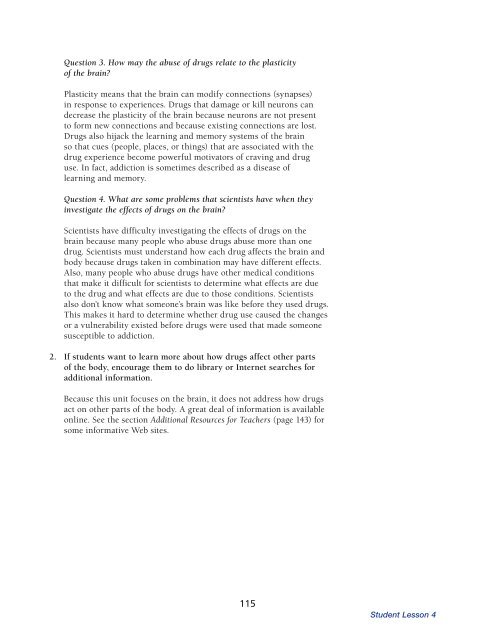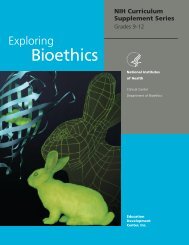Drug Abuse And Addiction - NIH Office of Science Education
Drug Abuse And Addiction - NIH Office of Science Education
Drug Abuse And Addiction - NIH Office of Science Education
You also want an ePaper? Increase the reach of your titles
YUMPU automatically turns print PDFs into web optimized ePapers that Google loves.
Question 3. How may the abuse <strong>of</strong> drugs relate to the plasticity<strong>of</strong> the brain?Plasticity means that the brain can modify connections (synapses)in response to experiences. <strong>Drug</strong>s that damage or kill neurons candecrease the plasticity <strong>of</strong> the brain because neurons are not presentto form new connections and because existing connections are lost.<strong>Drug</strong>s also hijack the learning and memory systems <strong>of</strong> the brainso that cues (people, places, or things) that are associated with thedrug experience become powerful motivators <strong>of</strong> craving and druguse. In fact, addiction is sometimes described as a disease <strong>of</strong>learning and memory.Question 4. What are some problems that scientists have when theyinves tigate the effects <strong>of</strong> drugs on the brain?Scientists have difficulty investigating the effects <strong>of</strong> drugs on thebrain because many people who abuse drugs abuse more than onedrug. Scientists must understand how each drug affects the brain andbody because drugs taken in combination may have different effects.Also, many people who abuse drugs have other medical conditionsthat make it difficult for scientists to determine what effects are dueto the drug and what effects are due to those conditions. Scientistsalso don’t know what someone’s brain was like before they used drugs.This makes it hard to determine whether drug use caused the changesor a vulnerability existed before drugs were used that made someonesusceptible to addiction.2. If students want to learn more about how drugs affect other parts<strong>of</strong> the body, encourage them to do library or Internet searches foradditional information.Because this unit focuses on the brain, it does not address how drugsact on other parts <strong>of</strong> the body. A great deal <strong>of</strong> information is availableonline. See the section Additional Resources for Teachers (page 143) forsome informative Web sites.115Student Lesson 4
















